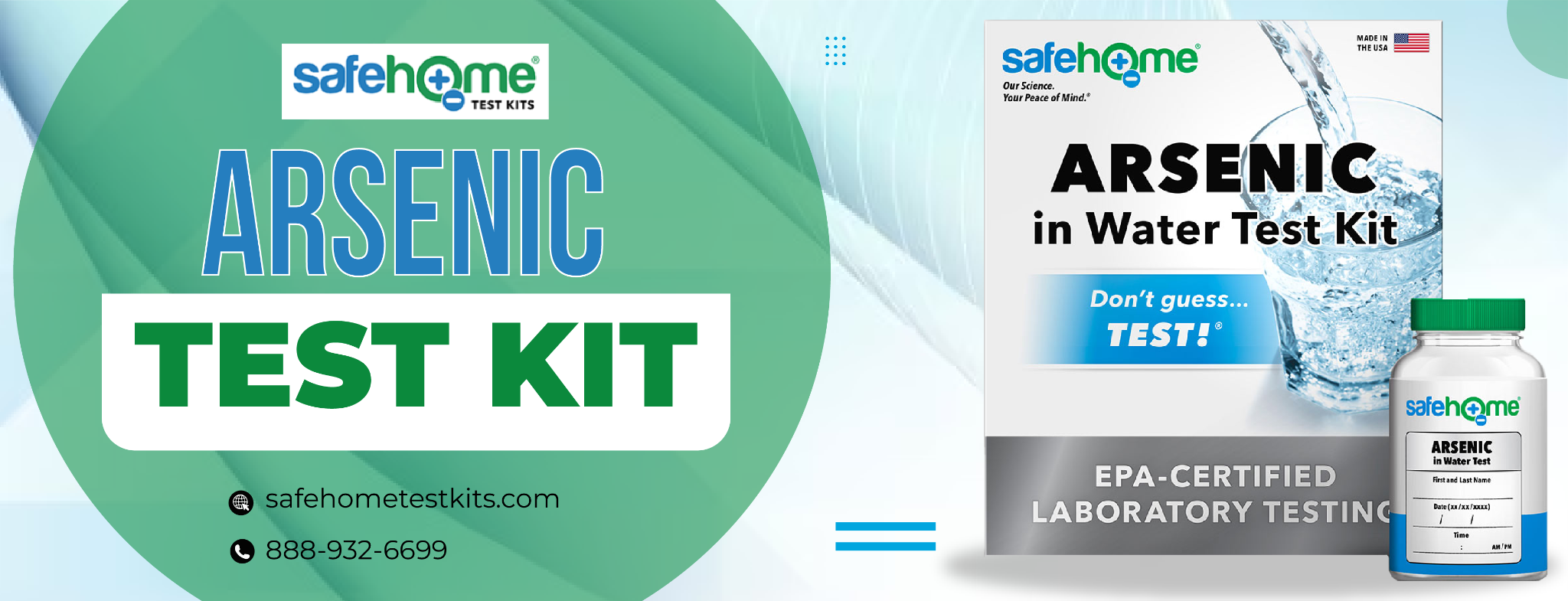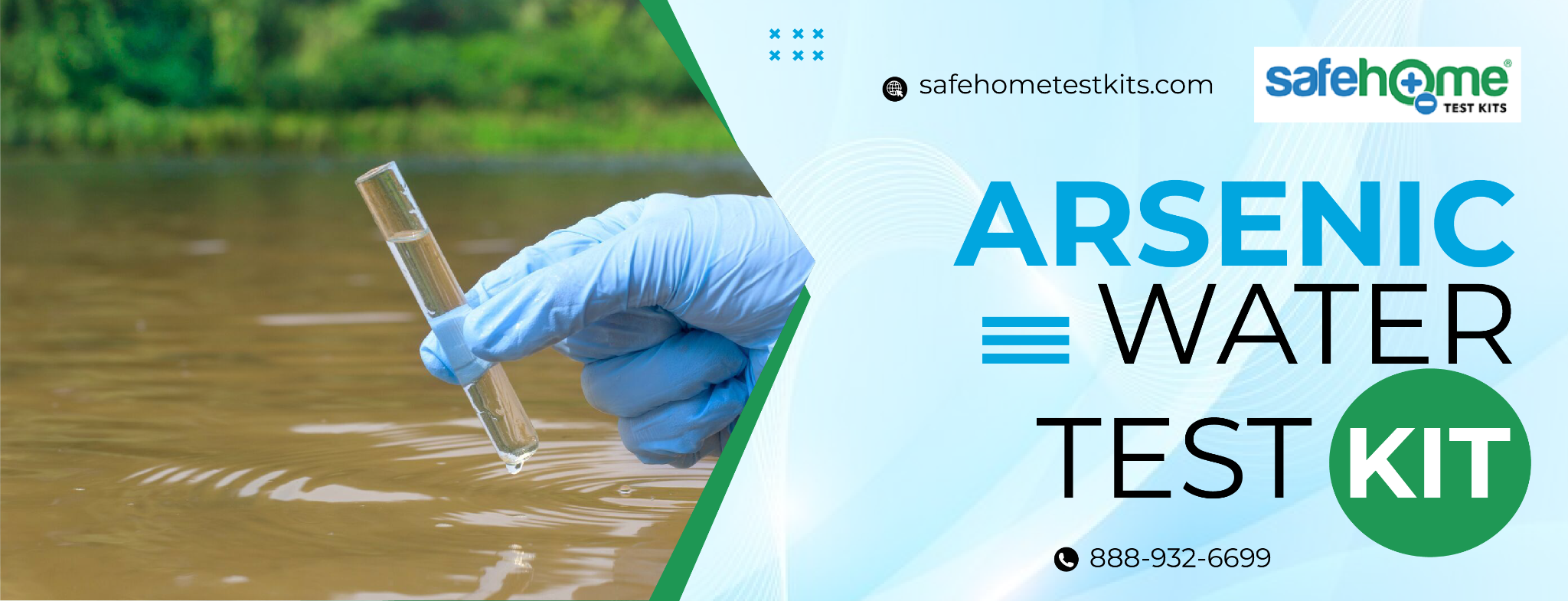Arsenic Test Kit: A Vital Tool for Arsenic Detection in Your Environment

Detecting arsenic in your environment is not just a precautionary measure; it’s a necessity. Arsenic, a naturally occurring element, lurks in soil, rocks, and groundwater sources. Its presence can stem from various sources, including industrial activities and agricultural practices. While arsenic might not be visible to the naked eye, its harmful effects are profound and far-reaching. In this comprehensive guide, we’ll delve into the dangers associated with arsenic, the diseases it can cause, how to detect its presence, and why investing in an Arsenic Test Kit is crucial for safeguarding your health and well-being.
The Danger of Arsenic
Arsenic, although naturally occurring, poses significant risks to human health when present at elevated levels. Prolonged exposure to arsenic can lead to a myriad of health problems, ranging from skin lesions and cardiovascular diseases to various types of cancer, including skin, lung, bladder, and kidney cancer. Children are particularly vulnerable to the adverse effects of arsenic exposure, which can impair cognitive development and stunt growth.
Diseases Linked to Arsenic Exposure
Arsenic exposure is a serious concern due to its association with a range of debilitating diseases and health conditions. Understanding the specific diseases linked to arsenic exposure is crucial for recognizing the gravity of the situation and implementing effective measures to mitigate its harmful effects.
Skin Lesions:
Prolonged exposure to arsenic-contaminated water or soil can lead to various skin lesions. These lesions may include hyperkeratosis, characterized by thickening of the skin, and pigmentation changes, resulting in discoloration or darkening of the skin. While skin lesions may initially appear benign, they can progress to more severe conditions if exposure continues unchecked.
Cardiovascular Diseases:
Arsenic exposure has been unequivocally linked to an increased risk of cardiovascular diseases. Chronic exposure to arsenic is associated with hypertension, a condition characterized by high blood pressure, which can strain the heart and lead to cardiovascular complications. Additionally, arsenic exposure contributes to atherosclerosis, where plaque builds up inside the arteries, narrowing them and restricting blood flow. Peripheral vascular diseases, which affect the blood vessels outside the heart and brain, are also more prevalent in individuals exposed to arsenic.
Cancer:
The International Agency for Research on Cancer (IARC) classifies arsenic as a Group 1 carcinogen, signifying its carcinogenicity in humans. Chronic exposure to arsenic significantly elevates the risk of developing various types of cancer, including skin, lung, bladder, kidney, and liver cancer. The carcinogenic properties of arsenic make it a potent contributor to cancer incidence, highlighting the urgent need to address arsenic contamination and reduce exposure levels.
Neurological Disorders:
In addition to its effects on the skin, cardiovascular system, and cancer risk, arsenic exposure has also been implicated in the development of neurological disorders. Cognitive impairment, characterized by deficits in memory, attention, and decision-making, has been observed in individuals exposed to arsenic. Furthermore, developmental delays, particularly in children exposed to arsenic during critical stages of brain development, can have long-lasting consequences on cognitive function and academic achievement. Peripheral neuropathy, which involves damage to the nerves outside the brain and spinal cord, is another neurological disorder associated with arsenic exposure, resulting in symptoms such as numbness, tingling, and weakness in the extremities.

Indications of Arsenic Presence
Detecting the presence of arsenic in your environment is crucial for safeguarding your health and well-being, but it can be challenging due to its odorless, tasteless, and colorless nature. Despite these inherent challenges, certain indicators can help alert you to potential arsenic contamination:
Unexplained Health Issues:
One of the primary indicators of arsenic presence is the emergence of unexplained health issues among you or your family members. These health problems may include skin lesions, gastrointestinal disturbances, or respiratory issues. Skin lesions, such as hyperkeratosis and pigmentation changes, are common manifestations of arsenic exposure. Gastrointestinal problems, such as abdominal pain, nausea, vomiting, and diarrhea, can also signal arsenic contamination. Similarly, respiratory issues like coughing, wheezing, and shortness of breath may indicate exposure to arsenic through contaminated air or water sources.
Foul Odor or Taste in Water:
While arsenic is odorless and tasteless, contaminated water may exhibit unusual odors or tastes due to other pollutants present alongside arsenic. If you detect a foul odor or an unpleasant taste in your water supply, it could be a warning sign of arsenic contamination. However, it’s essential to note that not all contaminated water sources will exhibit noticeable odors or tastes, emphasizing the importance of regular testing to ensure water quality and safety.
Discoloration of Water:
Water containing high levels of arsenic may exhibit visible signs of contamination, such as discoloration, cloudiness, or sedimentation. If you notice any changes in the appearance of your water, including unusual coloration or the presence of particles or sediment, it’s essential to investigate further for potential arsenic contamination. While discoloration alone may not confirm the presence of arsenic, it warrants immediate attention and testing to assess water quality accurately.
When to Consider an Arsenic Test Kit
Investing in an Arsenic Water Test Kit is not just a precautionary measure; it’s a critical step in ensuring the safety and purity of your water supply, particularly if you rely on well water for your household needs. Here are some scenarios where testing for arsenic becomes imperative:
Using Well Water:
Regular testing for arsenic is essential if your household depends on well water for drinking, cooking, and other domestic purposes. Unlike municipal water systems, which are subject to rigorous monitoring and regulation, private wells are often not routinely tested for contaminants like arsenic. Therefore, homeowners with private wells are responsible for ensuring the quality and safety of their water supply through periodic testing. Arsenic contamination in well water can pose significant health risks, making regular testing a crucial preventive measure.
Living in Arsenic-Prone Areas:
Certain regions are known for elevated levels of arsenic in their water sources due to geological factors or human activities. If you reside in an area with a history of arsenic contamination or have concerns about the quality of your water source, testing for arsenic is advisable. Geological surveys and studies conducted by environmental agencies can provide valuable insights into the prevalence of arsenic in specific regions. By proactively testing for arsenic, residents of arsenic-prone areas can identify potential risks and take appropriate measures to safeguard their health.
Experiencing Health Symptoms:
If you or your family members exhibit symptoms of arsenic exposure or unexplained health issues, testing for arsenic can help identify potential contaminants in your environment. As discussed earlier, arsenic exposure can manifest in various health problems, including skin lesions, gastrointestinal disturbances, respiratory issues, and neurological disorders. If you notice any unusual symptoms or changes in your health that could be attributed to arsenic exposure, seeking prompt testing is crucial for pinpointing the source of contamination and mitigating further risks.

The Safe Home® Arsenic Test Kit: Your Reliable Solution
Our Arsenic Test Kit is designed to provide homeowners with a reliable and accurate means of assessing arsenic levels in their water supply. What sets the Safe Home® Arsenic Test Kit apart from other kits is its comprehensive approach to testing. The Arsenic Water Test Kit includes EPA-certified lab testing for total arsenic, ensuring the highest accuracy and reliability.
Key Features of the Safe Home® Arsenic Test Kit
- EPA-Certified Lab Testing: Your water sample undergoes analysis by certified scientists using state-of-the-art equipment, guaranteeing precise results.
- Quality Control Measures: Integrated quality control samples eliminate background interference, ensuring the accuracy and reliability of the test results.
- Easy-to-Use: The test kit comes with clear instructions, making it simple and convenient for homeowners to collect and send water samples for analysis.
- Peace of Mind: With the Safe Home® Arsenic Test Kit, you can know that your water is free from harmful arsenic contamination.
Protecting yourself and your loved ones from the dangers of arsenic exposure starts with awareness and proactive measures. By understanding the risks associated with arsenic, recognizing the indications of its presence, and investing in reliable arsenic test kits like the Safe Home® Arsenic Test Kit, you can take control of your water quality and ensure a safer, healthier environment for your family.
For more information or to purchase your arsenic test kit today, contact us at:
Phone: 888-932-6699
Email: info@safehometestkits.com
Product link: https://safehometestkits.com/product/safe-home-arsenic-in-drinking-water-test-kit/
Take the first step towards ensuring the safety of your water supply. Reach out to us now!


